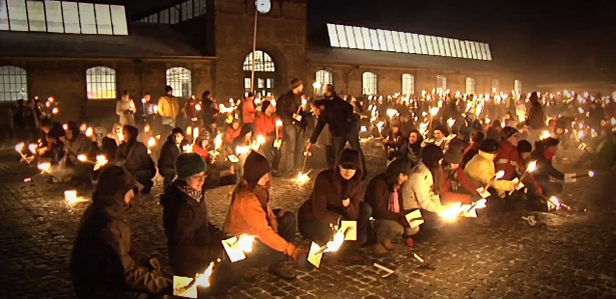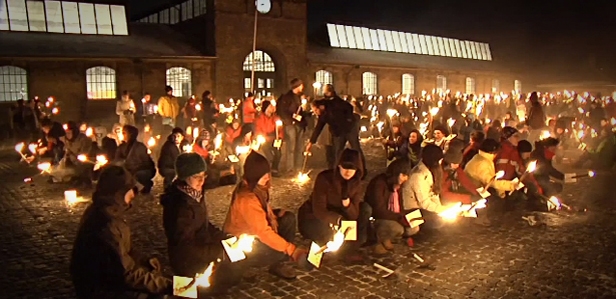 Activists gather outside Copenhagen’s Bella Center on the final night of last year’s climate talks.Courtesy 350.orgIt’s funny that we still understand climate change as an “environmental issue” and consider it the job of “the environmentalists” to avert the widespread human suffering it threatens to create. And it’s funny that environmentalists are so often berated and criticized for failing to find the right strategy or “framing” to convince United States senators to take the threat seriously. Most environmental organizations grew out of efforts to save parks, wild lands, and specific waterways from development and industrial pollution. They’ve done enormous good on these fronts, but saving a park is nothing like the task of remaking the nation’s energy system and ridding the entire economy of carbon pollution. Why should we expect conservation groups to make sure the job gets done?
Activists gather outside Copenhagen’s Bella Center on the final night of last year’s climate talks.Courtesy 350.orgIt’s funny that we still understand climate change as an “environmental issue” and consider it the job of “the environmentalists” to avert the widespread human suffering it threatens to create. And it’s funny that environmentalists are so often berated and criticized for failing to find the right strategy or “framing” to convince United States senators to take the threat seriously. Most environmental organizations grew out of efforts to save parks, wild lands, and specific waterways from development and industrial pollution. They’ve done enormous good on these fronts, but saving a park is nothing like the task of remaking the nation’s energy system and ridding the entire economy of carbon pollution. Why should we expect conservation groups to make sure the job gets done?
Meanwhile, Senate Republicans and “centrist” Democrats — some of the most powerful people in the nation — continue to do essentially nothing to address a problem that threatens to bring widespread human suffering. So it’s nice to see Thomas Friedman identify Republican obstructionism as the real barrier to progress in his column today:
They would rather we send more Americans to fight terrorism in the Middle East, let petro-states hostile to our interests get richer, and let China take the lead in the next great global industry than ask Americans to pay a little more for the gas they use or the carbon pollution they put into the air. If OPEC, China, and Russia could vote, they would be 100 percent supportive of the Republicans.
How about we stop honoring our soldiers and our military families and start helping them? Nope. The Republican view of fighting the war on terrorism is that rather than ask all of us to make a small sacrifice to weaken our foes and buttress our troops, we should ask only a few of us to make the ultimate sacrifice. And that’s called being tough?
Of course, proper direction of our righteous indignation doesn’t solve the problem. But it does put pressure on the 40 to 50 senators who are choosing to block the nation’s progress on energy. If more of the media followed suit, it might even make a difference.



